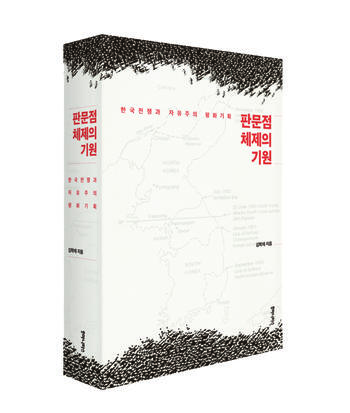The Origins of the Panmunjom Regime - The Korean War and Liberal Peace Projects
Hakjae Kim – 2015
The Origins of the Panmunjom Regime
The Korean War and Liberal Peace Projects
(Seoul : Humanitas, 2015)
in Korean
Hak-Jae Kim (Freie Universität Berlin)
Abstract
Why was the Korean War ended by the military armistice agreement? Why could it not be developed into a political conference for making a formal peace treaty? To answer these questions, this book examines how international laws and institutions (related to War and Peace) were implemented to the case of the Korean War (1950-53). In this book, the consequence ofthe Korean War armistice negotiation is called the Panmunjom Regime (1953).
As a part of research project on the Global History of international law and with insights of historical institutionalism, this book attempts to write an intellectual and institutional history of the Korean War instead of military history of battles. This book especially seeks to overcome previous "Cold War study" approaches based on realistic perspective, with a hope to replace them with a "Peace study" approach.
The Korean War case was a typical case in which, as usual, ascending/descending argumentations conflicted each other in politics of international law. But the Korean War was a unique case where the UN intervened for the first time in its history by military means with exceptional Security Council resolutions. These decisions, process and consequences can be understood by using a broader perspective on the evolution of the ‘liberal peace’ ideas since the Vienna treaty, the Versailles treaty, and the establishment of the UN system. The author seeks to get a sense of connectedness between 19th century’s European history and 20th century's East Asian History.
After providing four typology of peace projects (Peace of God and justice, peace of Hobbes, Peace of Kant and the peace of Durkheim), this book divides the two major "Liberal peace projects" of the early 20th century, as a Kantian peace Project, comparing it with Cold war style Hobbesian Project, In addition to this, it also examined how Hans Kelsen, (Carl Schmitt), Quincy Wright, Leo Gross, Julius Stone, Joseph Kunz, Hans Morgenthau, Mcdougal and Hersch Lauterpacht have discussed on the Korean War case regarding each issues(UN intervention, China recognition, Crossing 38th parallel, voluntary repatriation of Prisoners of War, San Francisco peace treaty, Armistice and political conference etcs.)
It also attempt to connect the Korean War case to broader East Asian regional history, by looking the consequences of the Chinese intervention, San Francisco peace treaty with Japan (1951) and Geneva conference for the first Vietnam War (1954) and the Bandung conference (1955).
As a conclusion, this book argues that previous liberal peace projects only left serious flaws and limitations, meaning that the Panmunjom regime was a failure of liberal peace projects. Both the legal punishment approach as well as the power balance approach failed to achieve a stable, permanent peace system. Therefore, the book argues that this Panmunjom regime should be supplemented by a ‘social peace’ approach, by referring to the Durkheimean Peace. This new approach emphasizes 'social solidarity' instead of the Hobbesian State or the Kantian International Law or individualism. ‘Peace as a solidarity’ should become an alternative imagination for future peace in Korea and East Asia.
Contents
Part 1. The Panmunjom Regime and 20th century’s liberal peace projects
Ch. 1. The Asian Paradox and the Panmunjom regime
1. What is the Panmunjom regime?
2. Peace studies and The Panmunjom regime
3. Liberal Peace theories and four ideal types of Peace
Ch. 2. Kantian liberal peace and global ‘rule of law’ project
1. The origins of the 20th Century’s liberal peace project
2. 'Liberal Moment' and establishment of UN
3. the UN as a global ‘rule of law’ project
Ch. 3. Hobbesian hierarchy and the peace as security
1. What is the Cold War?
2. Institutionalization process of the ‘Hobbesian Peace’
3. The management of War by UN system
4. Discriminative security order of Hobbes
Part. 2. The Panmunjom Regime and implementation of the liberal peace project
Ch. 4. The early decisions during the Korean War and Kantian projects
1. The outbreak of the War and "Double State of Exception"
2. Debates on the procedure and nature of the UN intervention
3. Was the Korean War a ‘Just War’?
4. Limits of Kantian projects
Ch. 5. Chinese Intervention and the rise of Hobbesian Projects
1. Chinese Intervention and the US policy of Non-recognition of the ‘Illiberal’
2. The emergence of the balance of power and discussions within the UN
3. Two modes of the liberal peace : militaristic(Korea) and economic(Japan) peace
4. The Origins of East Asian Cold War order and the Panmunjom Regime
Ch. 6. The prisoners of War Problem and the Kantian ideal of the sublime individual
1. The rise of the Voluntary repatriation principle
2. POW camp in Koje island and the screening process
3. The approval of the Voluntary repatriation principal at UN General Assembly
4. From a ‘free individual’ to a ‘defector program’
Ch 7. The birth of the Panmunjom regime and three peace models in East Asia
1. the Panmunjom regime: A liberal peace on the frontier of anti-communism
2. the Geneva regime : an incomplete peace and balance of power system
3. the Bandung regime : an alternative peace for postcolonial nationalism
Conclusion : the Asian Paradox and “peace as solidarity”
1.20th century’s liberal peace projects
2.Two liberal projects during the Korean War : Kant and Hobbes
3.A New paradigm of Peace : ‘Social peace’ and ‘solidarity’
Recommended by
Heonik Kwon (Cambridge Trinity college, Social anthropology)
Sebastian Conrad (Freie Universität Berlin, Global History)
MyungRim Park (Yonsei University, Politics)
Dongchoon Kim (SungKongHoe University, Sociology,)
JangJip Choi (Eemeritus professor, Korea University, Politics)


